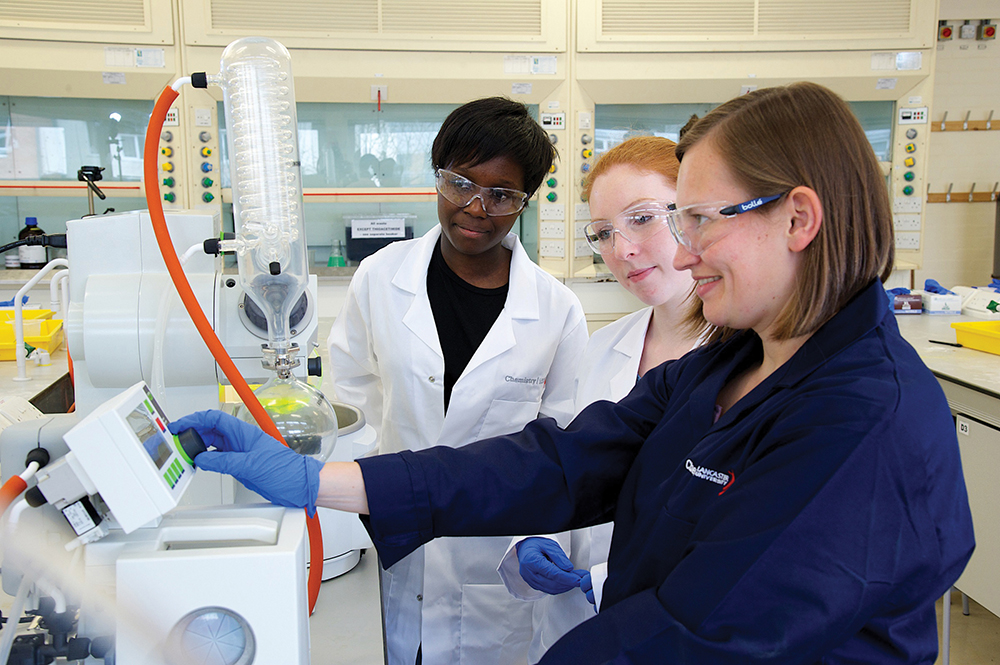In this edition of Chemical Industry Journal, we speak to MartinGilmore, Head of Partnerships and Business Engagement for Physical Sciences at Lancaster University, to find out about seed funding and facilities available at Lancaster and how businesses are already using those to accelerate innovation.
OVER 11,000 PARTNERSHIPS
Here at Lancaster University, The Times and Sunday Times University of the Year 2018, we have always welcomed the challenges that businesses provide us. I manage business collaboration in chemistry, physics and engineering as part of an award-winning partnerships and engagement team at Lancaster. Our team is embedded alongside our researchers and has assisted over 11,000 businesses. We have a thriving business community on our 560-acre parkland campus, hosting over 110 businesses. We liaise with all areas of the chemical industry, ranging from multinational oil, chemical and pharmaceutical companies, to a host of smaller enterprises producing new and specialised products.
EXPANDING TEAM OF RESEARCHERS
We have an expanding team of researchers at the forefront of their fields, and an extensive array of new instrumentation and equipment to support our innovation activities. Our research strengths are in chemical synthesis, chemical theory and computation, and physical and analytical chemistry. Current research projects include the discovery that a compound in green tea can reduce amyloid plaques in the brain in Alzheimer’s disease, funded by the British Heart Foundation.
EXPANDING SET OF FACILITIES
Our £11.4m cTAP building offers managed office accommodation and laboratory space exclusively for industry collaboration, ideally suited to start-up companies, Small and Medium Enterprises (SMEs) and R&D teams from established companies. What sets the facility apart is the £7m investment in equipment, across four suites, with dedicated experimental officers whose role is to collaborate with industry in unlocking the potential of the equipment in improving processes and creating new products. We can also provide access to a diverse range of facilities across campus.
SEED FUNDING AVAILABLE
We facilitate a wide variety of interdisciplinary collaborative research projects, which include over £30m investment from Europe via structural funding to work with SMEs, and projects funded by the Government’s £725m Industrial Strategy Challenge Fund. We also have £140,000 seed funding available for technical support and access to the specialist instrumentation. Right now we are seeking new partners to work with on their exciting innovative projects, with around £10,000 funding available per company.
CASE STUDY 1: PROPERTIES OF POLYMERS INTERNSHIP
There are also lots of ways businesses can start a relationship with Lancaster University and benefit from the expertise, ambition and focus of our 4,200 science and technology students. For example, through internships and recruitment services.
Chemistry student Callum Wallace did a three-month internship at polymer solutions provider Victrex Plc., based in Lancashire, where he worked in their labs examining the thermal and mechanical properties of a new type of polyaryletherketone polymers.
Adam Chaplin of Victrex Plc. said: “We find that interns such as Callum are very useful in driving this sort of work forward by focusing on it, whereas permanent staff typically have numerous other priorities. Callum was very helpful and we couldn’t have completed this research as quickly without his help and the Lancaster University Science and Technology Internship Programme.”
Victrex are recruiting more interns this year and funding is available if you have a chemical challenge for our students.
CASE STUDY 2: CROWN PAINTS KTP
For more intensive one to three-year research projects, Knowledge Transfer Partnerships (KTP) is a UK-wide programme, which has been helping businesses for over 40 years to improve their competitiveness and productivity. KTPs form a three-way partnership between a company, an academic, and a graduate. Crown Paints entered into a KTP with the aim of finding innovative solutions for water based paint-manufacturing streams.
“Our KTP sees Crown Paints teaming up with a Lancaster University Chemistry and Chemical Engineering Departments’ graduate with a project objective to use chemistry to design and develop processes to reduce, reuse and recycle paint manufacturing and post-use waste, helping to create a circular economy. This is a very exciting collaboration. We have already realised some significant improvements in our waste water process and we are on track with developments to increase our reuse and recycling within the manufacturing process.” Rachel Demaine, Environmental Manager, Crown Paints.
www.lancaster.ac.uk/ctap










